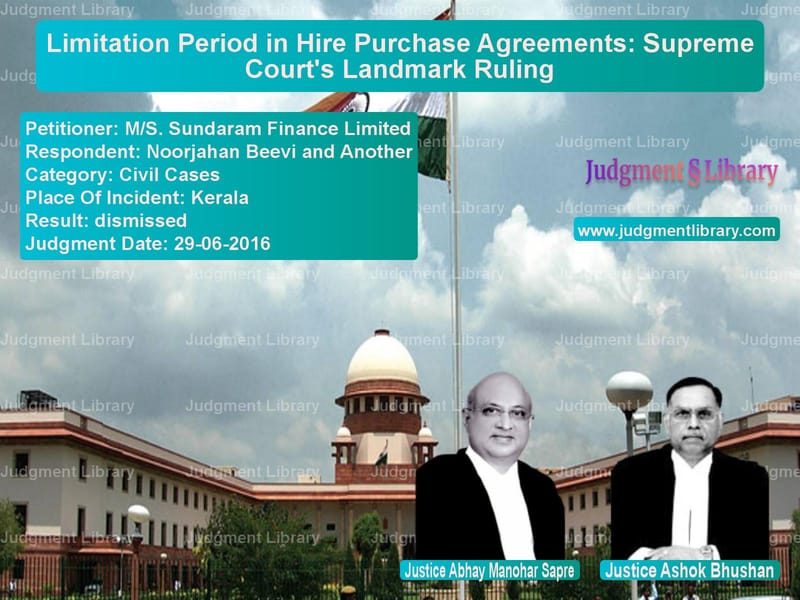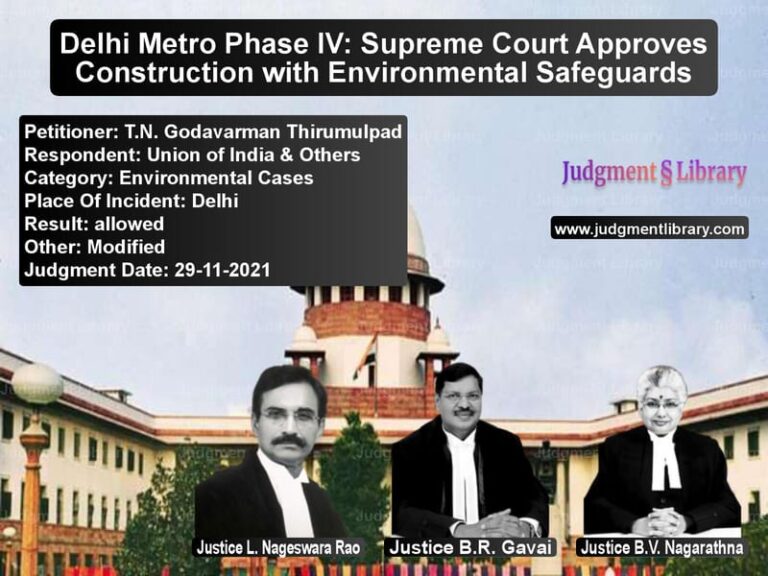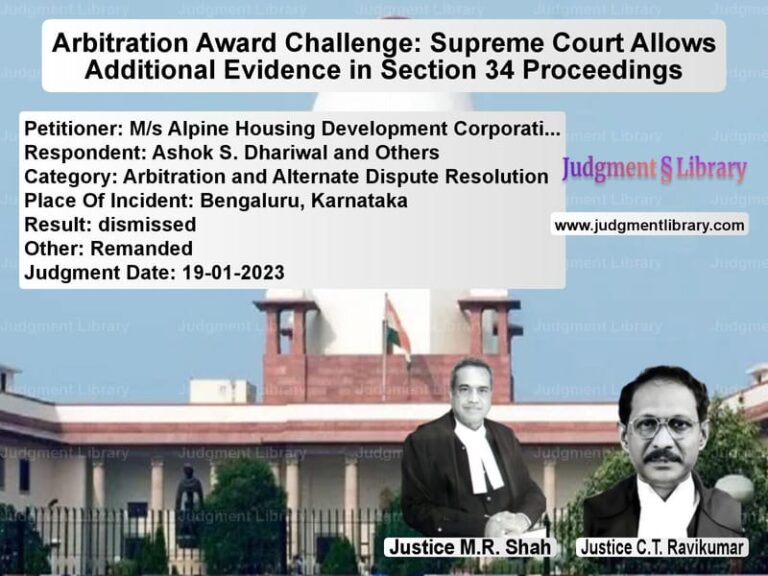Limitation Period in Hire Purchase Agreements: Supreme Court’s Landmark Ruling
The Supreme Court of India, in M/S. Sundaram Finance Limited vs. Noorjahan Beevi and Another, provided a detailed ruling on the limitation period applicable in hire purchase agreements. The judgment settled the issue of whether the limitation period for initiating recovery proceedings starts from the date of default in installment payments or from the date of sale of the financed vehicle. The decision holds significant implications for financial institutions and borrowers alike.
Background of the Case
The dispute arose when M/S Sundaram Finance Limited entered into a hire purchase agreement with Noorjahan Beevi on September 20, 1983. The agreement involved financing a vehicle for ₹1,47,000, to be repaid in 36 monthly installments. However, the borrower defaulted on payments starting from May 20, 1984. As a result, the financier seized the vehicle on February 9, 1985 and subsequently sold it on May 30, 1985. Even after adjusting the sale proceeds, a balance of ₹40,138 remained outstanding.
Upon non-payment of the balance, the financier issued a legal notice and eventually filed a suit on May 25, 1988. The suit was dismissed by the trial court on grounds of limitation, leading to a series of appeals that culminated in the Supreme Court’s judgment.
Legal Issues Involved
- Whether the limitation period commenced from the date of the first default in May 1984 or from the date of sale of the vehicle in May 1985.
- Whether the claim should be governed by Article 113 (residuary clause) of the Limitation Act, 1963, or by a specific article applicable to contract breaches.
- Whether the ‘right to sue’ accrued when the financer exercised its right to seize the vehicle or when the final payment became due.
Arguments by the Petitioner (Sundaram Finance Limited)
The petitioner presented the following arguments in favor of its claim:
- The limitation period should begin from the date of the sale of the vehicle in May 1985, since that was the first moment the balance amount could be determined.
- Their claim was governed by Article 113 of the Limitation Act, which provides a three-year limitation period from the date when the right to sue accrues.
- The agreement contained a clause that allowed the financier to recover dues within a stipulated time after repossessing the vehicle, and thus the limitation should be counted from the date of such action.
Arguments by the Respondent (Noorjahan Beevi)
The respondent, on the other hand, argued:
- The default occurred on May 20, 1984, and the financer had the right to initiate legal action immediately thereafter.
- Since no fresh agreement was signed at the time of repossession, the limitation could not be extended beyond three years from the first default.
- The borrower had already surrendered the vehicle, and thus, any claim beyond the repossession date was an attempt to unreasonably extend the limitation period.
Supreme Court’s Analysis
1. Determination of the Limitation Period
The Supreme Court examined the provisions of the Limitation Act and the contract terms. It held that the right to sue accrued at the moment of the first default in May 1984, and not at the time of sale of the vehicle. The court observed:
“If the hirer commits breach of the agreement, the rights of the financier under the agreement shall forthwith be determined ipso facto without any notice to the hirer.”
Based on this, the court ruled that the three-year limitation period started from the date of first default, making the suit filed in 1988 time-barred.
2. Relevance of the Sale of Vehicle
The petitioner argued that the limitation should be counted from the date of sale, as the final amount due was determined only after the sale proceeds were adjusted. However, the Supreme Court dismissed this argument, stating:
“Since there is no provision in the agreement that extends the limitation period until the sale of the vehicle, the computation must begin from the date of first default.”
3. Applicability of Article 55 vs. Article 113
The petitioner sought to rely on Article 113 of the Limitation Act, which allows three years from the date of accrual of the right to sue. However, the Supreme Court ruled that Article 55, which deals with contract breaches, was the correct provision. It noted:
“The agreement provides a clear remedy upon breach, and the limitation must be calculated from that date, making the claim time-barred.”
Key Precedents Considered
The Court referred to several landmark rulings to support its decision:
- SBP & Co. vs. Patel Engineering Ltd. (2005) – Stated that courts could examine whether a claim was time-barred before appointing an arbitrator.
- Indian Oil Corporation Ltd. vs. SPS Engineering Ltd. (2011) – Established that limitation should not be extended due to financial corporations’ internal processes.
- Sri Krishan vs. Kurukshetra University (1976) – Held that limitation periods should not be calculated from subsequent actions but from the date of the breach.
Final Judgment
The Supreme Court dismissed the appeal and upheld the lower court’s ruling that the suit was time-barred. It reaffirmed that in hire purchase agreements, the limitation period for recovering outstanding dues starts from the first default unless the contract explicitly states otherwise.
Implications of the Judgment
1. Impact on Financial Institutions
This judgment serves as a warning to financial institutions, emphasizing the need to initiate legal proceedings promptly upon default. Any delay in filing claims could result in dismissal on limitation grounds.
2. Rights of Borrowers
The ruling protects borrowers from indefinite claims by lenders, ensuring that disputes are settled within a reasonable timeframe.
3. Legal Strategy for Lenders
Financial companies must ensure:
- They initiate legal proceedings within three years of default.
- They include explicit contractual provisions extending limitation periods if necessary.
- They maintain clear records of payment schedules and defaults.
Conclusion
The Supreme Court’s ruling in M/S. Sundaram Finance Limited vs. Noorjahan Beevi provides much-needed clarity on the limitation period applicable to hire purchase agreements. It establishes that limitation begins from the first default and that financial institutions must act within the prescribed time to enforce their claims.
Don’t miss out on the full details! Download the complete judgment in PDF format below and gain valuable insights instantly!
Download Judgment: MS. Sundaram Financ vs Noorjahan Beevi and Supreme Court of India Judgment Dated 29-06-2016-1741872364648.pdf
Direct Downlaod Judgment: Direct downlaod this Judgment
See all petitions in Contract Disputes
See all petitions in Debt Recovery
See all petitions in Damages and Compensation
See all petitions in Judgment by Abhay Manohar Sapre
See all petitions in Judgment by Ashok Bhushan
See all petitions in dismissed
See all petitions in supreme court of India judgments June 2016
See all petitions in 2016 judgments
See all posts in Civil Cases Category
See all allowed petitions in Civil Cases Category
See all Dismissed petitions in Civil Cases Category
See all partially allowed petitions in Civil Cases Category







